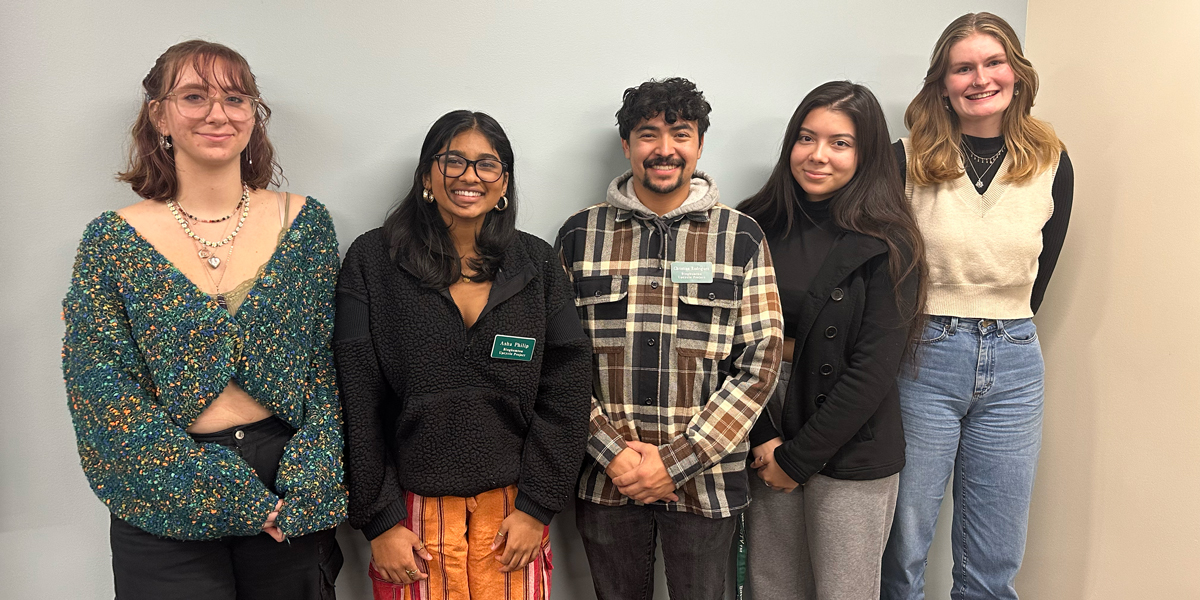Students launch Binghamton Upcycle Project, recycling bottles and cans
The new recycling project is a product of the Center for Civic Engagement’s Impact Incubator

Binghamton students Christian Rodriguez and Asha Philip are committed to making Binghamton University as green as possible, starting with one small change: recycling bottles and cans. They found support in launching the Binghamton Upcycle Project (B-UP) through the Center for Civic Engagement’s (CCE) new Impact Incubator program.
“The plan is to collect bottles and cans from residential halls and The Union, and then send them to one of the recycling centers off campus,” Rodriguez, a senior environmental science major who serves as the project’s executive director, said.
From there, Rodriguez explained, they can earn a little over five cents per can. The funds will go toward creating a new grant through Harpur Edge to which student-led environmental initiatives can apply — existing student organizations and new groups.
“After collecting funds, we plan to meet with environmental clubs on campus. Then we’ll allocate the money based on what clubs would benefit most,” Philip, a junior biochemistry major and B-UP’s field director, said.
Rodriguez has been recycling bottles in his personal life for years, and joining the project also came naturally to Philip, who is part of the Hinman College Public Service Learning Community. She tries to find ways to get involved as often as she can.
“I’ve always wanted to create impact and change,” Philip said. “It’s hard when you’re one person to say, ‘I want to create this big change.’ But with the B-Up Project, we can start small and it gets bigger and bigger.”
Joining Rodriguez and Philip on the project’s executive board are Haydee Gonzalez Ramirez ,communications director and a junior philosophy, politics, and law major; Maggie Saville, education director and a senior environmental science major; and Isabel Bogdan, creative director and a junior biology major.
Currently, the team is focused on pulling the project out of its infancy stage — which means raising money, obtaining more recycling bins and gathering volunteers.
“One goal is to introduce the project into local high schools. So any high schoolers in the area that are thinking of going to Binghamton for college can just jump right into the project. That way, we can have consistent volunteers,” Rodriguez said.
To accomplish this, they hope to utilize connections with local schools that already exist as part of the CCE’s Youth Initiative.
“The Impact Incubator is a new program we are piloting this semester to help launch student-led initiatives that aim to have a positive impact on the Binghamton community,” Trevor Fornara ’23, the civic education coordinator at the CCE said.
The Impact Incubator provides $500 in seed funding as well as access to resources and support from CCE staff. Additionally, students working through the incubator meet weekly with Fornara and Heidi Nelson, a first-year program assistant in the CCE, to talk through future plans for their initiatives, the successes they achieve and potential challenges they may face.
In addition to the B-UP Project, Fornara sponsors two other student groups through the incubator. Like B-UP, those groups focus on community engagement and improvement.
For their part, Rodriguez and Philip hope the B-UP Project inspires other students to seek out ways to have a positive impact on their community and the environment.
“If you talk to the right people, they can help you push your idea through,” Rodriguez said.
The B-UP Project started as a small idea for Rodriguez, he pointed out. A simple everyday action became something bigger, and he hopes that the Impact Incubator can allow for ideas similar to his to grow. But for now, Rodriguez and the B-UP Project are content to stay small and focus on what they can do here and now, on campus.
“I think it’s a great step to being a green school,” Philip said. “And, you know, our school color is green — so we have to do something about that.”
Binghamton University is dedicated to community engagement that advances community priorities, enhances faculty teaching and research and supports student development. Through the Center for Civic Engagement, the University prioritizes these relationships through funding, support and ongoing partnerships. Solidifying this commitment, the University is seeking the Carnegie Classification for Community Engagement, an elective classification that reflects strong institutional commitment to community engagement through our mission, identity and practices.
